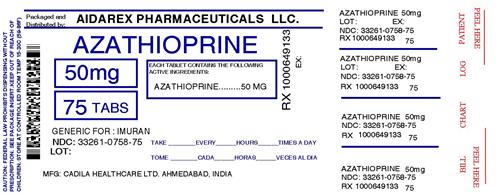
Azathioprine Tablet while Breastfeeding
What is Azathioprine Tablet used for?
Is Azathioprine Tablet usage safe while breastfeeding? If a lactating mother is using it can there be any effect on growth or development of infant?

Nursing Mothers The use of azathioprine tablets in nursing mothers is not recommended. Azathioprine or its metabolites are transferred at low levels, both transplacentally and in breast milk.17, 18, 19 Because of the potential for tumorigenicity shown for azathioprine, a decision should be made whether to discontinue nursing or discontinue the drug, taking into account the importance of the drug to the mother.
Azathioprine Tablet Breastfeeding Analsys
Azathioprine while Breastfeeding
SafeCAS Number: 446-86-6
Even though it is metabolized to mercaptopurine, just tiny amounts of this drug have been found in breast milk (4 - 18 micrograms/liter). Among several breastfed infants of mothers who were treated with Azathioprine failed to be detected in the blood nor side effects were found. Long-term infectious diseases were not more common among exposed infants. Exposition would be minimized if nursing is resumed 3 hours after last dose.
Azathioprine Tablet Breastfeeding Analsys - 2
Azathioprine while Breastfeeding
CAS Number: 446-86-6
Most experts consider breastfeeding during azathioprine to be acceptable.[1][2][3][4][5][6][7][8] Studies in women with inflammatory bowel disease, systemic lupus erythematosus or transplantation taking doses of azathioprine up to 200 mg daily for immunosuppression have found either low or unmeasurable levels of the active metabolites in milk and infant serum. Some evidence indicates a lack of adverse effects on the health and development of infants exposed to azathioprine during breastfeeding up to 3.5 years of age, but long-term follow-up for effects such as carcinogenesis have not been performed. Mothers with decreased activity of the enzyme that detoxifies azathioprine metabolites may transmit higher levels of drug to their infants in breastmilk. Cases of mild, asymptomatic neutropenia have been reported, so it might be desirable to monitor exclusively breastfed infants with a complete blood count with differential, and liver function tests if azathioprine is used during lactation, although some authors feel that monitoring is unnecessary.[9] Avoiding breastfeeding for 4 hours after a dose should markedly decrease the dose received by the infant in breastmilk.[10]
What should I do if I am breastfeeding mother and I am already exposed to Azathioprine Tablet?
Azathioprine Tablet is safe in breastfeeding and should not create any health problem for your baby but in case you feel any health issue associated with Azathioprine Tablet you should contact your doctor or health care provider. Be it pregnancy or lactation you shall keep your doctor informed.
I am nursing mother and my doctor has suggested me to use Azathioprine Tablet, is it safe?
Usage of Azathioprine Tablet is safe for nursing mothers and baby, No worries.
If I am using Azathioprine Tablet, will my baby need extra monitoring?
No
Who can I talk to if I have questions about usage of Azathioprine Tablet in breastfeeding?
US
National Womens Health and Breastfeeding Helpline: 800-994-9662 (TDD 888-220-5446) 9 a.m. and 6 p.m. ET, Monday through Friday
UK
National Breastfeeding Helpline: 0300-100-0212 9.30am to 9.30pm, daily
Association of Breastfeeding Mothers: 0300-330-5453
La Leche League: 0345-120-2918
The Breastfeeding Network supporter line in Bengali and Sylheti: 0300-456-2421
National Childbirth Trust (NCT): 0300-330-0700
Australia
National Breastfeeding Helpline: 1800-686-268 24 hours a day, 7 days a week
Canada
Telehealth Ontario for breastfeeding: 1-866-797-0000 24 hours a day, 7 days a week
